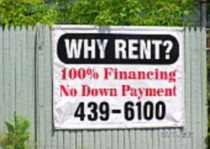Coach Mitch’s REFLECTIONS
Know the risks
It is very important to know the tax collections law in the state and county in which you want to invest. If you do not take this precaution, then you do so at your own risk and eventually, at your expense.
I try to not invest in tax liens. I often will not participate in tax deed auctions. Rather, I concentrate on targeting tax delinquent properties prior to the tax deed auction.
However, if you are in the marketplace, then you will be coming across all kinds of potential investments. Many will seem attractive and you will consider them. There are always people who are in trouble and they will be willing to sell their asset at a low cost. You may purchase or you may not but you will be tempted.
Know the law
Several mistakes are very common for first time deed purchasers. Unless you know the applicable law for that jurisdiction, you will be hurt. I can give several examples.
In almost all states, inferior liens are wiped out by a tax sale. But this is not true for every state. I’m sure that you will agree that this is important information to know before you bid on a property.
There are some states where some liens survive the tax deed sale. You need to know what specific liens survive the tax deed sale in each state that you are investing within.
Tax foreclosure law is different
One mistake is that most tax sale investors to not check into that states tax collection laws. Each state has tax foreclosure laws which are peculiar to that state.
What if you were to purchase a tax deed at an “Upset” tax deed auction sale in Pennsylvania and the property had a mortgage against it? Would you be liable for the mortgage?
Some liens are not removed
Pennsylvania has three different types of tax deed sales. No liens are removed at the initial Upset sale in PA. Therefore, you are liable for any lien on the property when purchased at the tax deed Upset sale. Most liens do not survive the auction sales which follow: the Judicial sale and the Repository sale, which comes last. In PA, since liens stay with the property through the initial tax deed sale, you risk losing the property if you do not pay them. No other state has these particular rules. Texas and other states do not strip all liens from a property when going through a tax sale.
Another mistake
Further, if the deed is carried in your personal name, then your personal credit could be negatively affected if you did not pay the liens as specified.
Because the tax deed was purchased in the investor’s name, they became personally liable for the property. The owner of record is liable if anyone got injured or hurt on the property. The owner is also responsible for current taxes and any other assessments or association fees if the property is in a community.
Another mistake
If the investor had purchased the deed in the name of a business entity set up for the purpose of real estate investing, then the individual would not be held personally liable for any or all of these risks. It is easy to do. You just use a different piece of paper, a contract, to take ownership/control of a property. Using a business entity can insulate your personal name and assets and this could save your marriage and your financial future. Just something to think about.
Another mistake
Knowledge of tax deed law is good, but you also need to know how to check for the existence of liens against a property. Therefore, knowing how to do a title search is imperative. Many investors do not pay enough attention to this area, to their eventual regret.
Another mistake
Investors often take for granted that a property is in good shape. Investors usually do not perform proper due diligence on the property. Lien checking is but the first item on a checklist. Much more due diligence is necessary to do. Are there deed restrictions that impact the property? Is it buildable? Etc.
Result, a loss
If investing in tax lien certificates, it is wise to check for liens but it’s not devastating if you miss something. If you determine that you made a mistake in purchasing a particular tax lien certificate because the property does not have enough value, then you can always decide to not buy the next tax certificate or you may not “take” the property via a foreclosure proceeding. In this case the loss will be limited to your initial investment, the cost of the taxes.
However, if you did not check for liens or for other vagaries and you did take ownership of that tax delinquent property, then, in certain states you are now responsible for any liens against the property that survived the tax deed sale. Don’t forget that you are also responsible for any current taxes and assessments and certain other claims against the property.
Another mistake
…enough already – this is depressing. Just do the basic mechanicals correctly, for your own sake and the real world advantages of real estate investing will take care of the rest.
Coach Mitch’s “Ridiculously Simple System…” levels the playing field. It takes the risk out of investing because you are being shown what to do so that you do not falter.
See Coach Mitch’s “Ridiculously Simple System…” ™ for details.
Let’s get going.








Leave a Reply